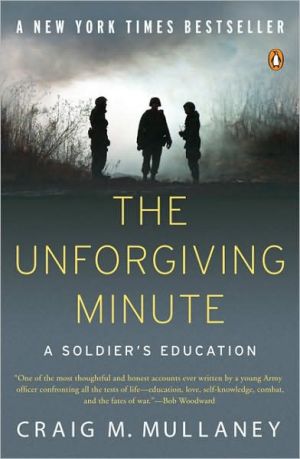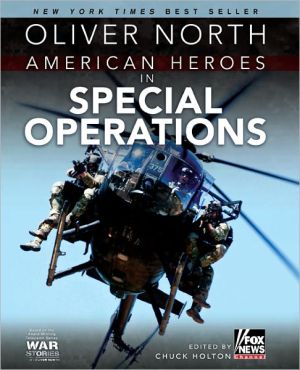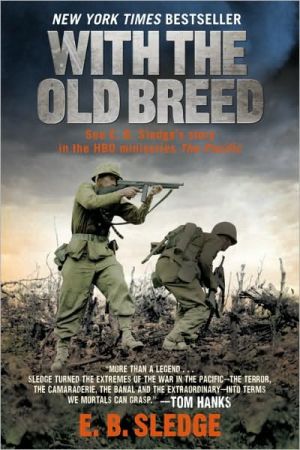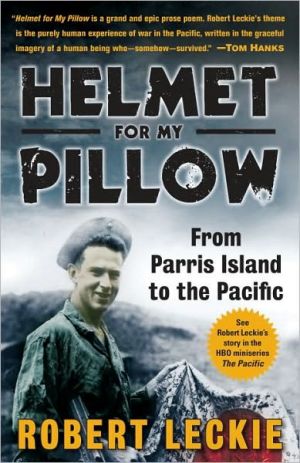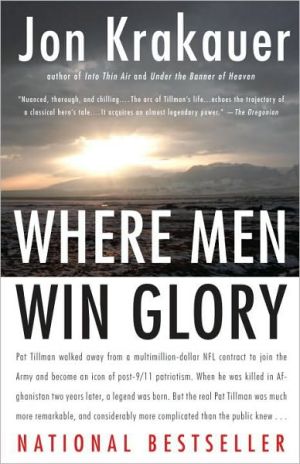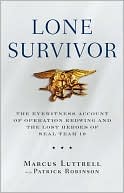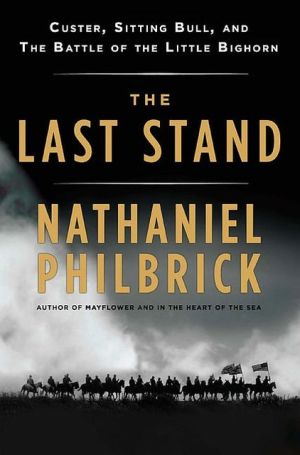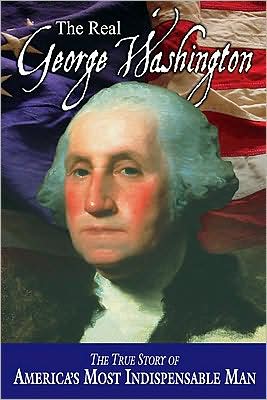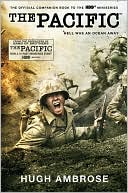The Unforgiving Minute: A Soldier's Education
"One of the most thoughtful and honest accounts ever written by a young Army officer confronting all the tests of life." -Bob Woodward\ In this surprise bestseller, West Point grad, Rhodes scholar, Airborne Ranger, and U. S. Army Captain Craig Mullaney recounts his unparalleled education and the hard lessons that only war can teach. While stationed in Afghanistan, a deadly firefight with al-Qaeda leads to the loss of one of his soldiers. Years later, after that excruciating experience, he...
Search in google:
A West Point grad, Rhodes scholar, and Army Ranger recounts his unparalleled education in the art of war and reckons with the hard wisdom that only battle itself can bestow. The Barnes & Noble Review In my 20-year career as a sergeant in the U.S. Army, I gradually became aware of one timeless fact about military life: it's an Us vs. Them war. The "Us" in this case are those who wear the uniform, the "Them" are the larger majority of the population who have never served in the armed forces and who don't have a clue what it feels like to lie on your belly at a rifle range in the temple-throbbing heat, gravel digging into your elbows, helmet tipping onto the bridge of your nose while you squint through the sweat waiting for a pop-up target to show itself 300 meters in the hazy distance, with the clock ticking and the M-16 rifle, loaded with 40 rounds, heavy in your hands and the range's safety instructors on the prowl, ready to thwack you on the helmet if your right leg is not cocked at a precise 45-degree angle; and all the time you're wrestling with the sweat, the helmet and the suffocation, you're aware this is only Stateside training -- what will you do when faced with the real thing in Iraq or Afghanistan?
\ From Barnes & NobleBarnes & Noble Discover Great New Writers\ "Were you ready?" a young cadet asks Mullaney, a history teacher at the Naval Academy. Is any soldier prepared for the unforgiving minutes they'll face in combat? July 1, 1996, was stamped on Mullaney's military records with an authoritative finality, the date of his entrance to West Point and the beginning of his education as a soldier. West Point grad, Army Ranger, and Rhodes scholar -- years later, his training and preparation land him in Afghanistan. Was the sum of his experience and education sufficient to face the life-changing test before him? \ \ Mullaney was born and raised in Rhode Island, the son of working-class parents, and his story is the extraordinary account of an amazing journey. Eager for the physical and mental challenges of West Point, his plebe's-eye view is at once hilarious and harrowing. The rigors of Army Ranger School readied him for a military career, and the louche pub crawls and intellectual tests at Oxford provided a two-year respite. Deployed to Afghanistan, Mullaney and his platoon face a deadly firefight with Al-Qaeda fighters in which one of his men is killed, forcing Mullaney to question his years of dogged and relentless preparation. \ \ Now, as he watches his younger brother chart a similar course, he recounts his life path, examining his own unforgiving minutes. In the process, Mullaney tells a remarkable story. (Spring 2009 Selection)\ \ \ \ \ Chris BrayIn this extraordinary book, Mullaney has taken the trouble to look very closely, and has had the courage to discover the limits to his own understanding. Readers will be fascinated to look over his shoulder.\ —The Washington Post\ \ \ Janet Maslin…[a] brisk, candid memoir…The Unforgiving Minute finds both suspense and pathos in the events that took place under its author's command. Its fierce climactic battle is recreated in searing detail. But what gives this memoir its impact isn't the external events that it describes. It's the inner journey of a man who is at first eager to learn as much as he can from service and scholarship. Later on he learns from his mistakes.\ —The New York Times\ \ \ \ \ BooklistYoung Captain Mullaney's admirable, literate autobiography, that of a veteran of combat in Afghanistan, adds much to knowledge of the modern army and makes a valuable contribution to the ongoing debate over what a "warrior" is these days. Mullaney wryly recounts his years at West Point and as a Rhodes Scholar at Oxford, then writes eloquently of infantry combat and the persistent burden of guilt for not bringing all his men home even as he makes his account a tribute to his fellow warriors. He concludes with sidelights on his teaching post at the U.S. Naval Academy and the moving story of his younger brother's graduation from West Point and subsequent passage into the ranks of the warriors himself. Almost impossible to put down for anyone interested in the modern U.S. Army or in modern warfare in general.\ \ \ \ \ Kirkus ReviewsKeenly intelligent war memoir whose central question is, "What is a man?"'First-time author Mullaney, a West Point graduate, Rhodes Scholar and veteran of combat in Afghanistan, searches for the answer while investigating a second question: What kind of man is a soldier? At West Point and in the Army, soldier and man are one and the same. Mullaney's intelligence and sensitivity are too fine-tuned for such a simple conflation. Nevertheless, war and the training he underwent to prepare for it provided the instruments with which he takes the measure of his own manhood. The oldest of four children in a working-class Irish-American family from rural Rhode Island, Mullaney was already mature beyond his years as the memoir begins with his 1996 departure for West Point, where he drove himself to excel in both sport and scholarship. The book is divided in three parts of unequal length: Student, Soldier and Veteran. In the first and longest section, Mullaney contrasts his Spartan education at West Point and Army Ranger School at Fort Benning, Ga., with the more Athenian style of scholarship at Oxford, where he read history and world literature, polished his rough edges and met Meena, the Tamil-American doctor-in-training who became his wife. As a soldier in Afghanistan, all of Mullaney's education was put to the test. He took pride in a humanitarian mission he led near Gardez to vaccinate members of the Kuchi tribe and treat their animals to a veterinary checkup. But when his company moved to Shkin, near the border with Pakistan and on the front of the war against al-Qaeda, the death of one of his soldiers made him agonize over his responsibility and doubt his ultimate commitment to the mission. Asa veteran, attending his brother's West Point graduation, Mullaney says, "there was so much I wanted to say to him...[but] I realized how little I could convey . . . the rest Gary would have to learn for himself."A philosophically ambitious account of coming to adulthood, only slightly marred by occasional bursts of sentimentality and sententiousness. Agent: E.J. McCarthy/E.J. McCarthy Agency\ \ \ \ \ From the Publisher"McLaren's subtle treatment avoids exaggeration while preserving the emotional moods the author intended for his memories of romance, combat, and death." —-AudioFile\ \ \ \ \ The Barnes & Noble ReviewIn my 20-year career as a sergeant in the U.S. Army, I gradually became aware of one timeless fact about military life: it's an Us vs. Them war. The "Us" in this case are those who wear the uniform, the "Them" are the larger majority of the population who have never served in the armed forces and who don't have a clue what it feels like to lie on your belly at a rifle range in the temple-throbbing heat, gravel digging into your elbows, helmet tipping onto the bridge of your nose while you squint through the sweat waiting for a pop-up target to show itself 300 meters in the hazy distance, with the clock ticking and the M-16 rifle, loaded with 40 rounds, heavy in your hands and the range's safety instructors on the prowl, ready to thwack you on the helmet if your right leg is not cocked at a precise 45-degree angle; and all the time you're wrestling with the sweat, the helmet and the suffocation, you're aware this is only Stateside training -- what will you do when faced with the real thing in Iraq or Afghanistan? \ No, the average American worker sitting in a cubicle decorated with Dilbert cartoons and worrying about the price of his daughter's orthodontics cannot fully appreciate what it's like to lace up shin-high boots every morning and go to work in a profession whose ultimate goal is to "kill the enemy." Then again, to be fair, I don't know what it's like to be a stockbroker, elementary school teacher, or logger. We're all encapsulated in our particular worlds, boundaried by the limits of our experience.\ Still, despite all the "Support the Troops" bumper stickers and the genuinely enthusiastic rallies in small communities as their sons and daughters march off to and come home from combat, there remains an almost geologic rift between those who fight and those who watch (and pray and worry). In the year I served in Iraq, I often struggled to bridge this gap of understanding in emails back home to well-meaning supporters. I could describe in detail what it felt like when terrorist mortars rained down on our camp at the outskirts of Baghdad and how a female soldier walking to dinner was hit by a stray shard of shrapnel and died from the resulting "sucking chest wound," but I couldn't make my correspondents empathize, only sympathize.\ In his memoir of life as a young army officer, The Unforgiving Minute, Craig M. Mullaney makes a good attempt to build a bridge across this deep, dark canyon. If he's not entirely successful in his execution, it's hard to fault his intent. The book is subtitled "A Soldier's Education," but it could also serve as a primer for the non-uniformed sector of the reading public. Like many other combat accounts, from Audie Murphy's To Hell and Back to Joel Turnipseed's Baghdad Express, Mullaney's book inches us a little closer to understanding life inside the uniform.\ Mullaney, the son of blue-collar workers from Rhode Island, opens his story as he and his fellow 18-year-olds tumble off a bus "like a startled herd of wildebeest" for their first day of training at West Point. As the senior cadets bellow at the new trainees, Mullaney describes a hellish, intimidating world that lies just behind the military academy's famed "Long Gray Line." At West Point, Mullaney writes, "our purpose was to follow, to obey, and to be formed in the image of our leaders." This induction, by turns, influences the rest of the book's pages, which faintly smell of conformity, as if the author wishes not to offend those he writes about. Granted, there are a few individuals who come in for Mullaney's criticism (including, most tellingly, his father, who abandons the family on the eve of his son's deployment to Afghanistan), but for the most part this is a gung-ho, "band of brothers" account from an intelligent, eager young man doing his patriotic duty. Mullaney was raised to believe that "responsibility preceded privilege," so it was almost a given that he'd join the military.\ Though some initially join the military to pay back student loans (present company included), secure a steady-paying job, or avoid prison time ("go to war or go to jail," runs a popular cadence refrain), Mullaney's service is entangled with his Catholic upbringing. He sees it as a spiritual calling and writes that West Point's educational experience "offered an almost religious quest for perfection...I wanted to graduate a better man."\ Whether or not a killing profession makes for a "better man" is open to debate, but what is clear in The Unforgiving Minute is the intensity of this one soldier's experience. Mullaney takes the reader through a battering round of training regimens, including four years at West Point, Ranger School (where he completes the nine-week course with a dislocated shoulder), the Infantry Officer Basic Course, and Airborne School. The grueling indoctrination to the army is broken only by the time he spends as a Rhodes Scholar at Oxford.\ His career as a lieutenant really begins when he's assigned to the 1st Battalion, 87th Infantry Regiment of the 10th Mountain Division. The division's motto, "We conquer men and mountains," is soon put to the test as Mullaney and the rest of his unit are deployed to Afghanistan.\ The fact that soldiering is no ordinary occupation becomes clear when Mullaney's commanding officer tells him he and his men must always be ready to step into their comrades' boots: "You have to assume you will be killed...or be ready to take over the company when I am. Make yourself dispensable." Coming to grips with the fact that you're a disposable number is not easy for a 24-year-old heading off to combat, but it's a necessity in the army. Mullaney quickly learns how high the odds are stacked against him when he goes out on his first combat patrol and realizes the vast scope of area he and his men are assigned to protect. "I had roughly one soldier for every three thousand Afghans."\ The difficult mission is further exacerbated by Mullaney's troubled conscience in the aftermath of the first time he fires at the enemy:\ I was uneasy with the excitement I felt about shooting. Shouldn't I have felt remorse at aiming live rounds at other people? Where was the clinical detachment? This had been raw and unfiltered...Discovering this killer instinct unnerved me, challenging my sense of humanity. I could kill -- and I might even like it.\ The Unforgiving Minute eventually builds to the moment for which we've waited nearly 300 pages: Mullaney's baptism of fire. His personal Normandy comes on a windswept ridge within firing distance of Pakistan's border. Responding to a mortar attack on their camp, he and his men probe the deep-gullied mountains in search of the rogue enemies with their rocket launchers. As his soldiers sweep the area, the hillside erupts "like camera bulbs at a concert" with fire from machine guns, antiaircraft guns, and rocket-propelled grenades. Mullaney's platoon had walked straight into an ambush.\ Though the account is breathlessly told, Mullaney holds his storytelling details at arm's length, only seldom letting slip with sentences like "It was loud and chaotic, and I wanted to piss in my boots." Unfortunately, the highest moment of drama in the book comes across like a PowerPoint debriefing; Mullaney divorces his head from his heart. Even when he later confesses to disillusionment with the mission, it's done with tepid caution: "The futility of finding al-Qaeda by trial and error was by now clear to almost everyone. It was like throwing darts in a dark room. Sometimes we hit the bull's-eye, but we didn't deserve to."\ While The Unforgiving Minute may prove to be an eye-opening education for the majority of readers, especially those who stand on the other side of the canyon of military experience, it falls short of being a combat masterpiece. If you want a blow-by-blow account of an Army career, then this is the book for you. But if you want to see the resulting blood from those blows, start with Tim O'Brien's If I Die in a Combat Zone or Anthony Swofford's Jarhead, and patrol the jungle of war literature from there. --David Abrams\ David Abrams's stories and essays have appeared in Esquire, Glimmer Train Stories, The Greensboro Review, and The Missouri Review. He's currently at work on a novel based in part on his experiences while deployed to Iraq with the U.S. Army.\ \ \
